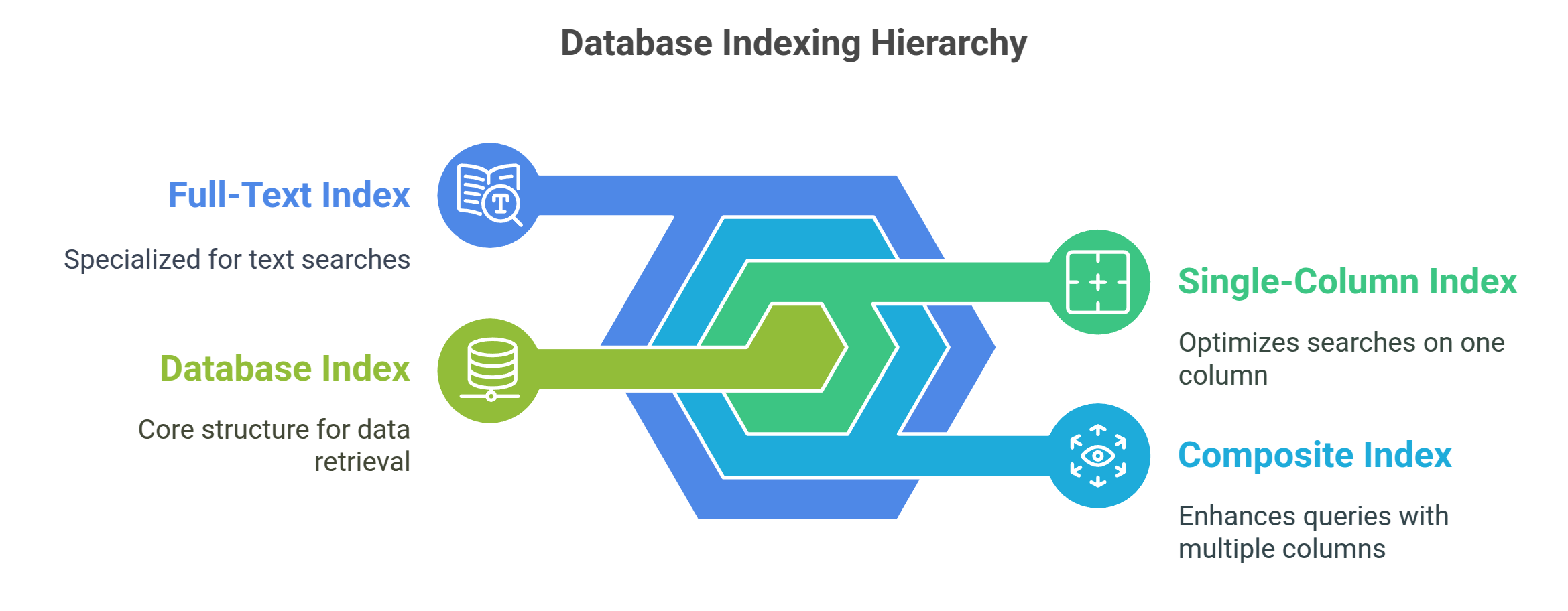
When dealing with large datasets, one of the key factors that can greatly enhance performance is the use of indexing. Think of a database as a giant library of information. Without an index, searching for a specific book could require scanning every book in the library. However, with an index, you can jump directly to the right shelf, making your search significantly faster.

A database index is a data structure that improves the speed of data retrieval operations on a database table. It functions similarly to an index in a book, allowing for fast lookups of specific values. By creating an index on columns that are frequently used in queries, we can significantly speed up search operations, reducing the time it takes to find data.
There are several types of indexes, each serving different use cases. Some common types include:
Without indexes, the database engine must perform a full table scan, checking every row in the table to find the data. This can be extremely slow, especially with large tables. Indexing, however, allows the database to locate the data much faster by keeping a sorted list of the values. For example, if you are searching for a specific user in a table of millions of records, an index can quickly direct the database to the exact location of that user’s information.
Consider the following SQL query searching for a customer by their last name:
SELECT
c.customer_id,
c.first_name,
c.last_name,
c.email,
o.order_id,
o.order_date,
SUM(oi.quantity * p.price) AS total_spent,
s.store_name
FROM
customers c
JOIN
orders o ON c.customer_id = o.customer_id
JOIN
order_items oi ON o.order_id = oi.order_id
JOIN
products p ON oi.product_id = p.product_id
JOIN
stores s ON o.store_id = s.store_id
WHERE
c.last_name = 'Smith'
GROUP BY
c.customer_id, o.order_id, s.store_name
HAVING
total_spent > 100
ORDER BY
total_spent DESC;
Without an index on the 'last_name' column, the database would need to scan every row in the 'customers' table to find matches. However, if an index is created on the 'last_name' column, the database can use that index to directly jump to the relevant records, vastly speeding up the query performance, especially in large datasets.
Indexing is a powerful tool for optimizing database performance. By carefully choosing the columns to index, and understanding the types of indexes available, you can significantly improve the efficiency of your database queries, making your application faster and more responsive. As databases continue to grow in size and complexity, mastering indexing is an essential skill for any database administrator or developer.
As the Head of Client Relations & Training at IRI, responsible for client engagement and training initiatives in data and software validation with a focus on resource tracking solutions. Ensuring seamless client experiences, effective training programs, and the successful implementation of innovative solutions.
Smart Fingerprint technology enables fast, secure, and error-free attendance tracking . . . . . .
Blockchain, is a game-changing technology with diverse applications. This blog simplifies what blockchain . . . .
AI Agents are transforming industries by making real-time decisions, automating workflows, and improving efficiency. From chatbots to self-learning business tools, these intelligent systems are . . . .